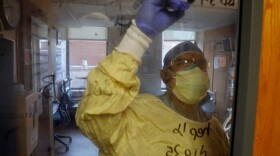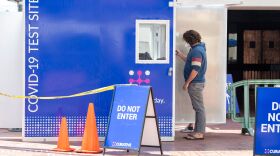
Will Stone
Will Stone is a former reporter at KUNR Public Radio.
!function(d,s,id){var js,fjs=d.getElementsByTagName(s)[0],p=/^http:/.test(d.location)?'http':'https';if(!d.getElementById(id)){js=d.createElement(s);js.id=id;js.src=p+'://platform.twitter.com/widgets.js';fjs.parentNode.insertBefore(js,fjs);}}(document, 'script', 'twitter-wjs'); [Copyright 2024 KUNR Public Radio]
-
The burning questions: What makes this newly identified variant so transmissible? And what does it mean for preventing spread?
-
Understaffed hospitals are already coping with increased patient demand heading into the holidays. They have few options to expand if omicron creates a huge new wave of COVID patients.
-
Many U.S. hospitals are already struggling with a wave of COVID-19 patients and now they are also racing to prepare for the omicron variant, which threatens to further accelerate hospitalizations.
-
The omicron variant is gaining a foothold in Europe. Scientists say it is spreading faster than delta and can do so even in places where many people are vaccinated. What could this mean for the U.S.?
-
Booster shots have been authorized for all U.S. adults, and the government is urging people to get them. But what if you've already had COVID and the vaccine?
-
After declining most of the fall, new infections are up again in more than half of U.S. states, worrying experts about what the holiday season may bring.
-
-
-
-




